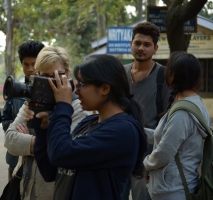In her fourth collection of short fiction "A Stranger's Touch", Indrani Raimedhi proves' once again her ability to weave magic out of everyday situations. With her sparse yet lyrical prose, Raimedhi conjures up the pathos, dreams and desires of believable characters -- whether it is the unfulfilled housewife transformed by her visit to a beauty parlour, a child with a tenible secret, or a young girl coping with her personal tragedy in the World Trade Center bombing. The impact of her stories linger long after they are read and they reveal the full kaleidoscope of life, with all its grand drama, unexpected surprises and bittersweet feelings. With a veteran journalist's felicity for exactitude, Raimedhi paints her canvas with bold strokes and wastes no time in plunging into the heart of each gripping story. The book is sure to captivate the discerning reader with the sheer beauty of its evocative language, the delineation of memorable characters and: the power of its narration.
"Barnali pushed the tinted glass door and stepped in.It was cool and dark inside. The din and bustle of the street was suddenly replaced by a hushed stillness. Gradually, some objects came into view-a row of high backed chairs facing a wall length mirror, a gleaming white Formica counter running along the length of the mirror. On the far-end of the low-ceilinged room, a curved wooden staircase leading upstairs. On the side facing the massive mirror was a sagging sofa of faded velvet, green in colour, with a single glass-topped table in front of it. A stack of magazines lay heaped untidily over it. A stale smell of nicotine mingled with after shave-hung in the confined space like a miasma.
Barnali licked her dry lips as a tremor passed through her body. The body sensed danger even before the mind did. The skin on her arms felt cold and the pupils of her eyes seemed to dilate and search the shadows with a sudden wariness. Some part of her willed her to swing open the glass door, return to the noise, the sunshine, the ordinariness of everyday experience. But greater than that was the will to be sucked into this heart of darkness. A man came down the narrow, twisting staircase at the back of the long room. He had heard her coming in and his· steps were swift, expectant. He was a young man, with a squat, powerful torso encased in a tight black T shirt. A folded towel hung from his left shoulder. Thick, curly hair framed his lean, tanned face and a well-trimmed moustache gave him a faintly rakish air. He crossed the floor towards her with a slight swagger, conscious of her eyes on him. His smile was friendly, almost intimate.
"This is Plaza Saloon?" her voice sounded shrill in the shadowy, confIned space. "Do you cut ladies' hair?"
"Yes, yes," he said, nodding quickly, "This is both gents and ladies beauty and hair-cutting saloon. Our ladies specialist . has gone for lunch. You sit here, Madam, she will come."
"Oh." She looked at her wristwatch, then out through the glass door to the street. The man moved cat-like, noiselessly around the room, flicking all the switches on the wall. At once the saloon was bathed with light. Fans started whirring. Lamps with gaudy brass fittings glowed from wall brackets. Adjustable lights shot beams of blinding light from the top of the wall mirror. Men in spandex briefs and Ray-Ban glasses sneered from posters. Aishwarya Rai smiled enigmatically from one comer, her hair falling in satin waves over a white lace dress. Bamali's eyes began to hurt.
"She will come just now, Madam." His tone was soft, gently pursuasive. "You can sit here." He swiftly rearranged the magazines on the table and gestured towards the sofa.
She had seen a woman when the young man had flicked on the lights. A woman staring back at her from the mirror. A woman daring her to flinch, to look away in shame, and defeat. A thirty-five year old matron, stodgy and commonplace, wearing a printed sari with a mismatched kmg-sleeved blouse, half-moons of sweat staining her arm pits. A woman with a limp, tired mass of hair carelessly tied back with a cheap wool band, a pair of sad, defeated eyes - that gave away nothing, only the weariness of a life lived for others, of days, months and years merging into a blurred routine of thankless tasks and dying dreams.
Once, that woman had been a girl, once that woman had known what it was to dream and laugh and move her limbs in ways that made dazed men follow her with their eyes. Once, her hair too had fallen in soft, dark waves to her waist. Once, that dull skin shared the velvety softness of unfolding petals. The waist had been a slender stalk then, rising proudly from the ripe swell of her hips. The breasts had been fIrm, thrusting tautly against the blouses that fought to hold them back, Strangers had brushed against her on sidewalks, murmuring hoarse endearments.
An uncle had held her tight one long ago aftemoon, twisting
her face so that he could kiss her, burying his face in her hair with a tortured groan, just a room away from where his wife was suckling their newborn child.
The young man stood leaning against a high-backed chair. The towel was gone and he jingled a bunch of keys in his right hand. He looked at the road through the tinted glass door. His brow was furrowed and he made a clicking sound with his tongue.
"This girl," he spat out the words in disgust. "No consideration for customers."
"Is she always late?" Barali put down the magazine she had been idly leafing through.
"No, no Madam," he said hastily. "Otherwise she is a good girl. Today her boyfriend came from Nagaon. Other days she brings tiffin from home."
She glanced at her wrist watch again. It was ten to one."







































